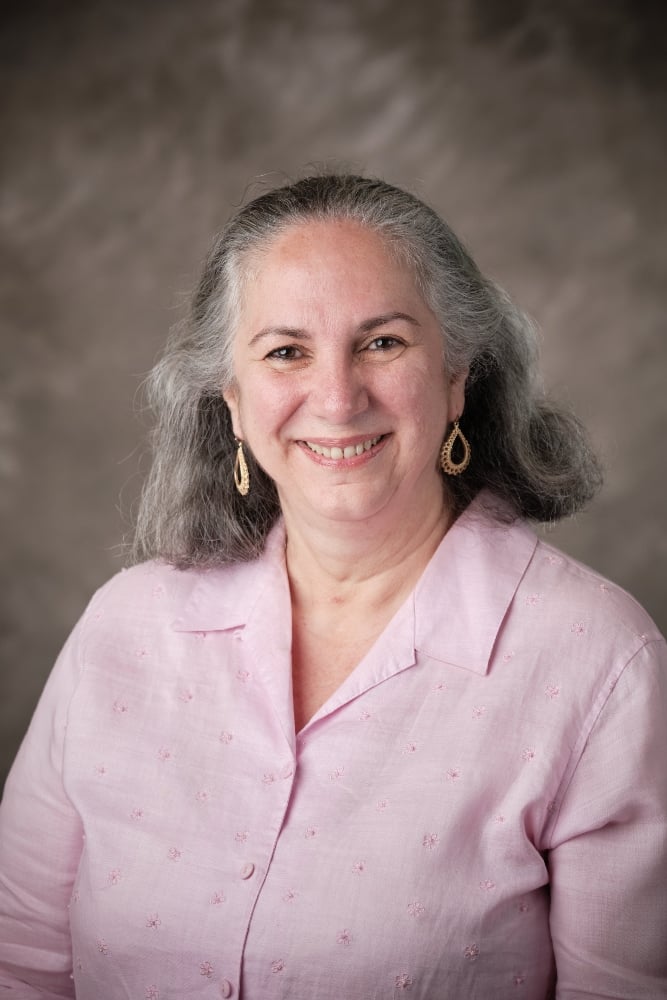 La música es una de las cosas que siempre me ha encantado. Desde que puedo recordar, había música en el ambiente, una maravillosa variedad de música que pareció levantar todo en nuestra casa. Me acuerdo que mi papa tenia muchos discos y los tocaba a menudo. Ahora si encuentro una de esas canciones queridas, respondo como si esto fuera una cuerda de mi propio corazón.
La música es una de las cosas que siempre me ha encantado. Desde que puedo recordar, había música en el ambiente, una maravillosa variedad de música que pareció levantar todo en nuestra casa. Me acuerdo que mi papa tenia muchos discos y los tocaba a menudo. Ahora si encuentro una de esas canciones queridas, respondo como si esto fuera una cuerda de mi propio corazón.
Aunque toco un poco de guitarra, no me gusta cantar y no tengo mucho talento para leer música, sin embargo, estoy rodeada de talento. Mi esposo tiene una voz encantadora y él todavía me dedica canciones con mucho cariño. Una de mis hijas toca flauta y marimba, otra tiene una voz pura y lindísima y también toca un poco de piano y guitarra, y mi hijo, como su padre, tiene un barítono profundo que se esta convirtiendo en un bajo. Es interesante que yo debería tener esta atracción a la música cuando soy simplemente fanatica, sin embargo, parece ser una parte natural de mi existencia.
Hace poco viajé 400 millas de ida y vuelta para oír a mi hijo en una interpretación especial de la Gloria de Vivaldi. En gran parte fui motivada por mi deseo de apoyar sus actividades. No puedo contar el número de conciertos a los que he asistido durante los últimos 18 años, pero la verdad es, yo caminaría 1000 millas para oír música hermosa.
Que afortunados somos de pertenecer a una tradición de fe que ha inspirado grandes obras musicales que también permanecen como parte de la celebración litúrgica. Decir que la Gloria de Vivaldi es sólo un concierto es disminuir la belleza de la obra como una oportunidad exquisita de la adoración.
El Catecismo de la Iglesia Católica se dirige a esta necesidad en las vidas de los fieles:
"La tradición musical de la Iglesia universal constituye un tesoro de valor inestimable que sobresale entre las demás expresiones artísticas, principalmente porque el canto sagrado, unido a las palabras, constituye una parte necesaria o integral de la liturgia solemne"(CCC 1156)
Las escrituras, también, nos exhortan a "recitad entre vosotros salmos, himnos y cánticos inspirados; cantad y salmodiad en vuestro corazón al Señor" (Ef 5,19; cf Col 3,16-17). Somos llamados a expresar nuestro amor, nuestras emociones a través de la canción.
Por eso usamos expresiones que reconocen el poder de la música, expresiones como "la música calma a la bestia salvaje" y más, como una consecuencia de adoración, "Él que canta reza dos veces" – una frase usada tan a menudo que no se sabe el origen, a veces atribuido a San Francisco, y otras veces a San Agustín.
Cuando rezamos la Gloria en la misa es una exaltación, una expresión alegre, y aunque a veces esta recitado, se debe de cantar, lo mismo sea con la música de Vivaldi que una versión contemporánea. Ese canto contribuye a la liturgia sagrada porque esto une nuestras voces en acción de gracias y alabanza.
El canto y la música forman parte de mi alma. Claro que viajaré grandes distancias para cantar alabanzas a nuestro Dios.
English Translation:
Music of the Heart
One of the things that I’ve always loved is music. Ever since I can remember there was music around me, a wonderful assortment and variety of song that seemed to lift everything in our home. I remember listening to my parents’ musical collection when I was a very small child, and now as an adult if I encounter one of their often-played, beloved songs, I respond to it as if it is a chord from my own heart.
While I fool around at playing the guitar, it seems my great strength has been in surrounding myself with loved ones who have a more serious interest in it. My husband has a lovely deep voice that he has often serenaded me with – one of my daughters plays flute and percussion, one has a lovely voice and has flirted a bit with the piano, and my son, like his father, has a rich baritone that more often than not becomes a bass. Funny, isn’t it, that I should have this connection to music when I am merely an observer, and yet, it seems to be such a natural part of my existence.
I recently drove 400 miles round trip to hear my son in a special performance of Vivaldi’s Gloria. Part of it is certainly motivated by my desire to support his activities. I cannot count the number of band and chorus concerts I have attended over the past 18 years, but the truth is, I’d drive 1000 miles to hear beautiful music, period.
How fortunate I am to belong to a faith tradition that not only has inspired great musical pieces, but continues to do so as part of its liturgical celebration. To say that attending Vivaldi’s Gloria was just going to a concert is to diminish the beauty of the piece as an exquisite opportunity for worship.
The Catechism of the Catholic Church addresses this needc in the lives of the faithful:
The musical tradition of the universal Church is a treasure of inestimable value, greater even than that of any other art. The main reason for this pre-eminence is that, as a combination of sacred music and words, it forms a necessary or integral part of solemn liturgy. (CCC 1156)
Scripture, too, in Ephesisans, exhorts us to speak "in psalms, and hymns, and spiritual canticles, singing and making melody in [our] hearts to the Lord." We seem driven to express our love, our emotions through song.
As a result of this understanding, we use expressions that acknowledge how powerful music can be, such as "music soothes the savage beast" and more directly as a force of worship, "He who sings prays twice"– a quote so often used that it has achieved mythic status, sometimes attributed to St. Francis, and alternately to St. Augustine.
The Gloria’s place in the Mass is an exaltation, a joyful expression, and while it is sometimes recited, the singing of it, whether it is Vivaldi’s music or a contemporary version, contributes to the sacred liturgy because it unites our voices in thanksgiving and praise.
How could I not travel great distances to sing praises to our God?
Copyright 2009 Maria Morera Johnson
About the Author

Maria Morera Johnson
Maria Morera Johnson, author of My Badass Book of Saints, Super Girls and Halo, and Our Lady of Charity: How a Cuban Devotion to Mary Helped Me Grow in Faith and Love writes about all the things that she loves. A cradle Catholic, she struggles with living in the world but not being of it, and blogs about those successes and failures, too.


.png?width=1806&height=731&name=CatholicMom_hcfm_logo1_pos_871c_2728c%20(002).png)
Comments